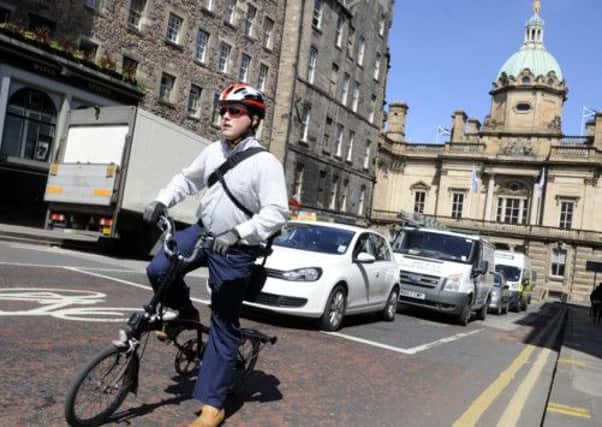Commuters urged to lead Scots cycling revolution


Mr Brown said getting people to switch to bikes to travel to work and school is the best way to realise the Scottish Government’s ambition of increasing cycling from 1 to 2 per cent of trips to 10 per cent by 2020.
However, the announcement came as a report published yesterday showed only ten of Scotland’s 32 councils have made significant improvements to cycling in the last five years and there is “no consistent approach across Scotland”.
Advertisement
Hide AdAdvertisement
Hide AdMr Brown told a cycling conference in Glasgow: “It’s where we can change commuting should be the priority. What we have to look at is where we can shift people from cars and other environmentally-damaging forms of transport to cycling and walking.”
The minister said major commuter routes were being identified, such as to and from Waverley Station in Edinburgh, including to the Scottish Government’s offices at Victoria Quay in Leith.
Mr Brown announced £3.6 million for the Edinburgh city council in September to upgrade Leith Walk for cyclists, which will include sections of cycle path segregated from both other traffic and pedestrians. He said increasing the number of people cycling would also be part of the next ScotRail franchise from 2015.
The minister said the most memorable part of his visit to examine cycling in the Netherlands this summer had been seeing so many “people in their work clothes” cycling to work.
However, he admitted cycling provision in Scotland was “decades behind” what it should be, and “substantially more” had to be spent on cycling infrastructure.
Jon Snow, the Channel 4 newscaster and president of cyclists group CTC, who chaired the conference, agreed that focusing on commuting was “the right thing to do”.
He said: “If you get cycle commuting going, you will also get the natural usage of bikes while people are at work.”
Mr Snow, who commutes by bike, said: “Cycle commuting will affect the way people live their lives while they are at work.”
Advertisement
Hide AdAdvertisement
Hide AdLondon Cycling Commissioner Andrew Gilligan, who also spoke at the conference, said cycle commuting had wider benefits to cities.
He said: “If you can convert a commuter to cycling, you will generate more cycle journeys – five a week – and also take a car off the road or free a seat on a train or bus at a time that these are most needed and the roads are busiest. It is a very cheap way of delivering transport capacity.
“Edinburgh is a small city and eminently commutable by bike.”
Mr Gilligan said a planned £30m east-west cycleway across central London would accommodate 3,000 cyclists an hour, but “you could not even get out of bed” with that little spending on creating more capacity on the London Underground.
However, Frank McAveety, Glasgow City Council’s sustainability and environment policy development convener, said commuting was too narrow a focus for cycling growth.
He said: “We should make it simpler for commuters to cycle, but it should be much more than that.
“We should also be reactivating former cyclists, make families see it as a participatory activity, and make cycling safer for everyone.” Lothian Green MSP Alison Johnstone, who chairs Holyrood’s cross-party cycling group, said: “I do not think you should have an either/or approach. Tickets to the velodrome events at next year’s Commonwealth Games in Glasgow were oversubscribed by up to 100 times, so there’s a far wider interest in cycling that we should tap into.”